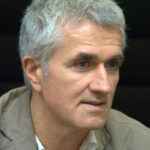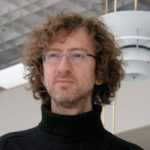Monday, 20 September 2021
All times are CEST
Special session: The Designscapes White Paper on “Design Enabled Innovation in Urban Environments”
Speakers meeting link: https://bit.ly/36uVRwF | Meeting attendants: Facebook live at https://www.facebook.com/designscapesproject/
- 10:00-10:15 Welcome and introduction
Nicola Morelli, Aalborg University - 10:15-10:45 Overview of the Designscapes White Paper
Chuan Li, University of Valencia, eConcult - 10:45-11:00 Q&A
- 11:00-12:00 Panel discussion
moderated by Nicola Morelli
Kike Correcher, designer and consultant, delegate of BEDA
Bertrand Derome, managing director of the World Design Organization
Ann Petermans, assistant professor at Hasselt University - 12:00-12:15 Q&A
- 12:15-12:30 Concluding remarks
Alessandro Rancati, European Commission, Joint Research Centre - 12:30 End
Our speakers

Nicola Morelli is Professor at Aalborg University in Denmark. He has previously worked at RMIT University, in Australia and at Politecnico di Milano, where he also completed his PhD in Industrial Design.
He is coordinating the Service Design Lab, a research unit working on several research projects on service design. His research focuses on public services, social innovation and design policies. He has also published several articles on service design methodologies, social innovation and sustainability. He contributed as scientific coordinator or WP leader in several EU funded projects, such as Life 2.0, Open4Citizens My Neighbourhood, MUV2020, DESIGNSCAPES and easyRights.

Chuan Li, doctoral researcher at the Research Unit for Cultural Economics (Econcult), Applied Economics Department of the University of Valencia. He is the main contributor to the Designscapes White Paper. His research areas focus on cultural and creative industries, museum studies, innovation in cultural and artistic organizations, design-enabled innovation etc.

Kike Correcher is a designer and consultant, who co-founded Filmac in 1991. He is a member of ADCV (Asociación de Diseñadores de la Comunidad Valenciana), where he was the president between 2005 and 2008. Kike codirected the ypography International Congress of Valencia with Raquel Plata. He is currently a delegate of READ (Red Española de Asociaciones de Diseño), BEDA (Bureau of European Designers Associations) and a member of the association València Capital del Disseny.

Bertrand Derome is managing director of the World Design Organization. He has been a not-for-profit organization manager and sustainable design advisor with more than 20 years experience. He is a confirmed lecturer who eagerly advocates for design’s social, environmental and economic impacts, for the betterment of the world. He has also served as President of the Quebec Association of Industrial Designers (ADIQ) in Montreal (Canada) and participates as an advisor on many public and sectoral committees and juries.

Ann Petermans is an assistant professor at the Faculty of Architecture and Arts at Hasselt University. She has an MSc degree in communication sciences from Ghent University and a PhD in architecture from Hasselt University. Her research interests pertain in particular to designing for experience in designed environments and for diverse user groups, and research related to design for subjective well-being in architecture and interior architecture. She chairs the Design Research Society’s Special Interest Group on Design for Wellbeing, Happiness and Health

Alessandro Rancati is an architect and designer trained at the Politecnico of Milano. He has extensive experience in design for policy, strategic design, design direction, service design, group facilitation and participatory leadership. Prior to joining the European Commission’s Joint Research Centre he ran a small communication and creative innovation studio and taught design and innovation at Elisava, Barcelona. He is a senior practitioner of design management, design direction, service design, design thinking and concept/context mapping and I am trained in group facilitation and participatory leadership. His ambition is to contribute to the development of a design culture in the European Commission.
In Europe, in the last decade, design as an innovation driver has been well recognised in EU policies to promote growth and competition at different levels of government. Despite an increasing awareness on design and design innovation across Europe, there are still gaps and some misunderstandings in the use of design to trigger innovation depending on the firm, sector and country. Particularly, SMEs, public sector organisations, and public administrative agencies miss out on the potential to use design as a source for improving efficiency and stimulating growth. These gaps are due both to uneven development of the design sector among countries within the Union and different enabling environments of cities where firms and organisations are located.
To tackle these structural obstacles and seize the opportunities presented by Design enabled Innovation (DeI), Europe’s design policy and support should go beyond traditional industrial policy for innovation. That is because design not only drives firm innovation and performance but also can enable systemic change and transition towards a green, inclusive and sustainable society. Cities are innovation hubs that create favourable conditions for DeI to materialise. Policy makers should fully consider and harness this capacity when developing and implementing design innovation policies. To achieve a broad-based perspective of innovation policy, it is key to enhance the DeI capacity of European urban environments.
